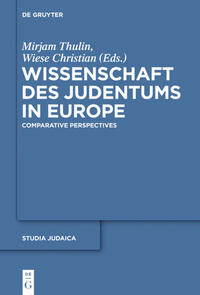
Despite the fact that it was never really accepted as part of European academia before the Shoah, the tradition of Wissenschaft des Judentums that emerged after the Enlightenment period spread throughout most of the European-Jewish communities, creating independent institutions, producing an impressive record of research on Jewish history, religion, literature and culture, and engaging in a creative and critical dialogue with other scholarly disciplines. Building on new research topics and exploring innovative theoretical and methodological approaches, this volume, written by an interdisciplinary group of scholars, provides the first comparative, transnational history of the different traditions and networks of Jewish Studies in Europe during the 19th and 20th centuries. Particular emphasis is put on the mutual perceptions and interactions of those national and local traditions as well as on the impact the challenges of modernity had on Jewish scholarship and its self-definition within the different social and cultural contexts in Europe.